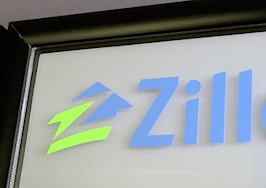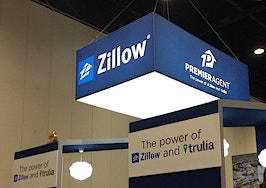A U.S. District Court in Illinois on Monday dismissed a lawsuit against real estate technology giant Zillow over the company’s marketing practices and its home value estimate (Zestimate) tool.
District Court Judge Amy St. Eve granted Zillow’s motion to dismiss the complaint with prejudice and dismisses the lawsuit in its entirety, according to the filing. The original lawsuit was thrown out in August 2017, but the plaintiffs came back with an amended complaint.
“We are pleased that the court has dismissed the claims in this lawsuit not once, but now twice — finding the allegations in the lawsuit without merit,” a spokesperson for Zillow told Inman. “The Zestimate has proven itself to be a sought-after and valuable free tool for consumers.”
The original complaint — filed by real estate attorney Barbara Andersen on behalf of Vipul Patel, Bhasker Patel, Jyotsna Patel and Castlebldrs.com — argued that Zillow’s Zestimate tool made it difficult for homes being sold without an agent to get market value. Andersen had previously sued Zillow herself over the Zestimate tool, but dropped the original suit to file this most recent complaint.
The plaintiffs stated that Zillow hurts for sale by owner homes (FSBO) and coerces sellers into retaining a real estate broker — by marking homes FSBO with low Zestimates and homes listed by Zillow’s premier brokers with high Zestimates. They further argued that the Zestimate was an opinion of value without proper due diligence or permission and that Zillow refused to take down those opinions of value when challenged.
Ultimately, St. Eve writes in the decision that the plaintiff’s claim failed “because Zestimates are not false or misleading representations of fact likely to confuse consumers. More specifically, based on Plaintiffs’ allegations and statements made on Zillow.com, Zestimates are merely an estimate of the market value of a property — as supported by Zillow.com’s statements that Zestimates may not be accurate.”
Zillow’s website specifically states:
“The Zestimate is not an appraisal and you won’t be able to use it in place of an appraisal, though you can certainly share it with real estate professionals. It is a computer-generated estimate of the worth of a house today, given the available data. Zillow does not offer the Zestimate as the basis of any specific real-estate related financial transaction. Our data sources may be incomplete or incorrect; also, we have not physically inspected a specific home. Remember, the Zestimate is a starting point and does not consider all the market intricacies that can determine the actual price a house will sell for.”
In a June 2017 memorandum that accompanied the original motion to dismiss, Zillow argued that Zestimates are constitutionally protected as free speech, similar to editorial reviews or stock forecasts.
Andersen said the decision didn’t come as a surprise, when reached by phone this morning.
“We were not surprised by [the decision] given that she dismissed the first one and gave her sense already that [Zestimates] were simply opinions,” she said. “We obviously disagreed and still do.”
Andersen said they haven’t decided what’s next for the suit, but that she and the plaintiffs, “take this case seriously and would consider taking it forward.”
She said if they decide to continue pursuing legal action, the next step would be to take the case to the United States Court of Appeals for the Seventh Circuit.
In January 2018, Zillow was hit an an anti-trust lawsuit over the Zestimate. The suit, brought forth by a New Jersey company alleges that Zillow is restraining competition between real estate brokers by making deals with certain brokerages to hide Zestimates on the brokerages’ for sale listings.




















